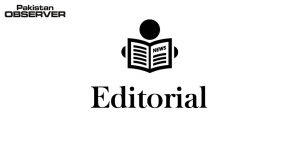IN a split verdict of 2-1, a special court in Islamabad on Tuesday found former military ruler retired General Pervez Musharraf guilty of high treason and handed him death sentence under Article-6 of the Constitution. This is first time in the history of the country that Article-6 of the Constitution has been invoked, an Army Chief declared guilty of high treason and handed capital punishment and, therefore, it has evoked strong and extreme reactions.
The judgement is being considered as symbolic and the aggrieved party has announced to go into appeal in the Supreme Court within one month where no one knows for sure what would be the ultimate outcome of the case. However, like division in the special court, there are two dominant viewpoints in the ensuing debate on background of the case as well as the quality of the verdict. Sharp reaction of Pakistan Army was highlighted by Director-General ISPR Major General Asif Ghafoor, who in a tweet, said army rank and file were pained and anguished over declaration of Musharraf as a traitor and award of capital punishment to him, adding that an Army Chief can be anything but traitor. The former President himself has expressed disappointment over the judgement in high treason case saying he fought wars for the country and offered tremendous sacrifices for the cause of the nation. There can be no two opinions that an Army Chief cannot be a traitor in any circumstances in the true sense of the word. Musharraf has to his credit many achievements and the country marched on the road to progress under his leadership. But one should not blame the special court as well because it had before it the definition of high treason as per Article-6 of the Constitution.
This Article of the Constitution says: “Any person who abrogates or subverts or suspends or hold in abeyance, or attempts or conspires to abrogate or subvert or suspend or hold in abeyance the Constitution by use of force or show force or by any other unconstitutional means shall be guilty of high treason” and it is now question of interpretation of actions and deeds to determine whether the crime of high treason has been committed or not. Legal aides of the former President and defence analysts believe that Musharraf did not receive fair trial and that Article-6 was wrongly applied in his case. They argue that the word ‘suspension’ of the Constitution was added by Parliament to Article-6 in 2010 while Musharraf imposed emergency in 2007 and therefore, the relevant provision cannot be enforced retrospectively. There are also complaints that the special court acted in haste and the accused was not given proper opportunity to defend himself. As against this, the court, during proceedings declared that Musharraf was given six opportunities to record his statement but he did not avail them. It is also said that the case was instituted way back in December 2013 and the defence could not fight the case appropriately despite availability of ample time at its disposal. Some legal experts and political analysts also claim that aiders
and abettors should have been tried simultaneously but others point out that it was decision of none else but the top court of the country that only Musharraf would stand trial in the case. As Musharraf wanted to drag thousands of people including the then Prime Minister and his cabinet, all chief ministers, governors, provincial cabinets, chiefs of armed forces, corps commanders, all judges who had taken oath on PCO and all BPS-20 and above members of the civilian bureaucracy, the court, perhaps, thought the case would then never conclude. There are differences of interpretation of relevant provisions, laws, procedures and actions but the judgement and reactions have highlighted that there was consensus in the country about the need for rule of law and supremacy of the Constitution. There would be no problems if all individuals and institutions act strictly in accordance with the law of the land and the Constitution. Hopefully, with the passage of time, things would get more clarity and the country would benefit from stability. The verdict is stirring but harmony among institutions is of utmost importance and all sides should work to strengthen institutions, allowing them to function freely as per constitutional scheme of things.










